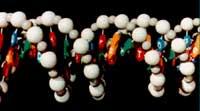DNA: ethics in exchange for secrets
2003/02/27 Roa Zubia, Guillermo - Elhuyar Zientzia
That living being, the human being, does not go back.

At first, in experiments with peas, he discovered the basic laws of inheritance; then, looking at the cell, he discovered that the information of life was stored in it. He explored the cell and reached the molecules. It took about a hundred years to unravel the machinery of life, inventing chromosomes, genes, proteins, DNA and other words to describe this fascinating discovery. Then he learned to read DNA and started doing it.
This study revealed many dangerous questions. For example, what happens when life information changes? There is already the possibility of modifying this information. It is not difficult. Nature does so constantly. And these changes are, moreover, the basis of evolution.
However, nature sometimes makes harmful alterations. Man so believes.
For example, in some islands of Micronesia there was a curious story: a change caused some of them to begin to look black and white. They could not see colors. They lost completely. In addition, a typhoon killed many of those who saw in colors. The situation was serious, but they progressed; over the years children were born who only saw in black and white, so this way of seeing was considered normal. They had to learn to differentiate gray well.
The western man believed it was an error of nature and discovered the origin of that error. Not only did he identify the chromosome and the wrong gene, but he also invented the repair pathway.

The error could be remedied and so they proposed it to the people who lived in these islands of Micronesia. People saw him in black and white, however, he didn't want to. Was it necessary to repair it? Was it necessary to destroy culture in black and white? Why were colors better than black and white? The human being must decide what is the answer to these questions, but when we say human we must know about the western man, about that of Micronesia or about which we speak.
It is clear that a simple modification of DNA could cause perverse ethical problems. What happens then when the change is complex?
We have intentionally chosen a simple example, but we can also reflect on cloning, transgenic foods, or the knowledge of the entire genome.
It is not easy to discover the secrets.
Opinion article prepared for Herri Irraria.

Gai honi buruzko eduki gehiago
Elhuyarrek garatutako teknologia





